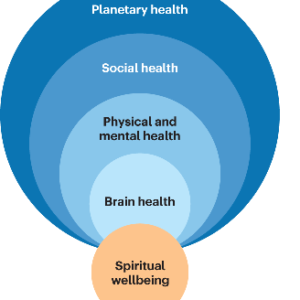Tips for Cultivating Well Health the Organic Way
The pursuit of well health through organic methods is becoming increasingly recognized as an essential component of personal well-being and environmental sustainability. This approach not only emphasizes the use of natural ingredients but also fosters a connection between consumers and the food sources that nourish them. By choosing organic options, individuals can significantly reduce their exposure to harmful pesticides and other synthetic chemicals, ultimately promoting healthier lifestyles. An illustrative example of this commitment to holistic health can be seen in products such as herbal teas, specifically the Organic Triple Mint herbal tea from Traditional Medicinals . This product highlights the digestive benefits of its organic ingredients—peppermint, spearmint, and lemon balm—while also embodying principles of organic farming through its USDA certification. Such offerings underscore the importance of informed choices in cultivating well health organically, setting the stage for a broader exploration of beneficial practices throughout this essay.
II. Understanding Organic Nutrition
A comprehensive understanding of organic nutrition is pivotal for anyone seeking to cultivate well-being through natural means. Organic foods are not only free from synthetic pesticides and fertilizers but often boast higher nutritional value than their conventional counterparts. Recent studies indicate that organic farming practices enhance soil quality and promote biodiversity, thus fostering more nutrient-rich produce (cite3). Furthermore, resources such as the Lancaster County Extension provide essential insights and guidance into effective organic cultivation methods, emphasizing community engagement and education in organic practices (cite4). The promotional materials for products like the Organic Triple Mint herbal tea from Traditional Medicinals illustrate the practical application of organic nutrition, highlighting ingredients known for their digestive benefits, thus connecting consumers directly to the efficacy of organic choices in promoting health. serves as a visual reminder of how these principles manifest in everyday nutritional products, reinforcing the argument for incorporating organic options in ones diet.
III. Incorporating Organic Lifestyle Practices
Incorporating organic lifestyle practices involves not only dietary changes but also a holistic approach to health that emphasizes sustainability and well-being. By choosing organic foods, individuals diminish their exposure to synthetic pesticides and other harmful chemicals, contributing to improved health outcomes. The growing interest in organic options, such as the emergence of organic and biodynamic wines in the global market, highlights consumer awareness surrounding the benefits of these practices (SHABELLOVA et al.). Moreover, adopting permaculture principles can facilitate a more sustainable way of living, enhancing food production while mitigating the adverse effects of industrial agriculture (Finkill et al.). An illustrative example of such a commitment is found in herbal products like Traditional Medicinals’ Organic Triple Mint tea, which underscores the potential health benefits associated with organic herbs while offering a caffeine-free option for digestive wellness . Embracing these practices fosters a deeper connection between consumers and their food sources, ultimately promoting overall well health.
IV. Conclusion
In conclusion, cultivating health through organic practices offers a holistic approach that fosters both physical well-being and environmental sustainability. Engaging in organic gardening not only provides access to nutrient-rich produce but also encourages a deeper connection with nature, instrumental in promoting mental health. The exploration of specific plants such as Jatropha, which demonstrates renewable energy potential along with agricultural viability, highlights the multifaceted benefits of organic cultivation (Balkema et al.). Additionally, the utilization of macroalgae like Gracilaria gracilis underscores the importance of biodiversity, serving as a source of bioactive compounds beneficial across various sectors, including food and pharmaceuticals (Bastos et al.). As consumers increasingly seek natural remedies, products like herbal teas exemplify the health advantages of organic choices, evidenced by offerings such as the Organic Triple Mint tea, which underscores the digestive benefits of its ingredients . Ultimately, adopting organic methods not only enriches individual health but also supports a sustainable future.
References:
- Boutry, Clémence, Dzhuvinov, Vasiliy, Fernandez, Maria-Martha, Friedli, et al.. “D2_2. Status Quo Analysis all Countries”. 2019, https://core.ac.uk/download/286031750.pdf
- Tedford, Meredith. “Exposure to Mindfulness Basics Through Existing Habits: A Brief 5-Week Curriculum for Exercisers”. DigitalCommons@Lesley, 2022, https://core.ac.uk/download/534850459.pdf
- Balmer, Ivo, Defila, Rico, DiGiulio, Antonietta, Kaufmann-Hayoz, et al.. “Sustainable consumption: towards action and impact. : International scientific conference November 6th-8th 2011, Hamburg – European Green Capital 2011, Germany: abstract volume”. 2011, https://core.ac.uk/download/17203350.pdf
- SHABELLOVA, VALERIYA. “Unveiling Opportunities: Analyzing the Chinese Wine Market for Italian Organic, Biodynamic and Natural Wines”. 2024, https://core.ac.uk/download/604158183.pdf
- Finkill, Guy. “Paradoxical Permaculture?”. 2020, https://core.ac.uk/download/288478536.pdf
- Mathis, Kelly R. “The Effects of a Vegetarian Diet”. Murray State\u27s Digital Commons, 2017, https://core.ac.uk/download/143837110.pdf
- Catulli, Maurizio, Cook, Matthew, Potter, Stephen. “Mapping Transitions towards Sustainable Consumption : Latitudes, Legends and Declinations in the Interaction between Consumers Culture and Sustainable Business Models”. 2014, https://core.ac.uk/download/29841528.pdf
- Balkema, A.J., Eijck, J.A.J., van, Jongschaap, R.E.E., et al.. “Jatropha Assessment. Agronomy, socio-economic issues, and ecology. Facts from literature.”. NL Agency, 2010, https://core.ac.uk/download/pdf/29238806.pdf
- Bastos, Gonçalo Filipe Pica Cabral. “Cultivation of the wild seaweed Gracilaria gracilis under laboratory scale: The Effect of Light Intensity and Nutrients on Growth, Pigment and Total Soluble Protein Content”. 2019, https://core.ac.uk/download/286562861.pdf
- Barion, Giuseppe, Dal Cortivo, Cristian, Dramis, Lucia, Ferrari, et al.. “Effects of field inoculation with VAM and bacteria consortia on root growth and nutrients uptake in common wheat”. ‘MDPI AG’, 2018, https://core.ac.uk/download/168403759.pdf
- Somaratne, W. G.. “The System of Rice Intensification (SRI) and food security among the poor: opportunities and constraints”. 2025, https://core.ac.uk/download/pdf/6764731.pdf







This Post Has 2 Comments